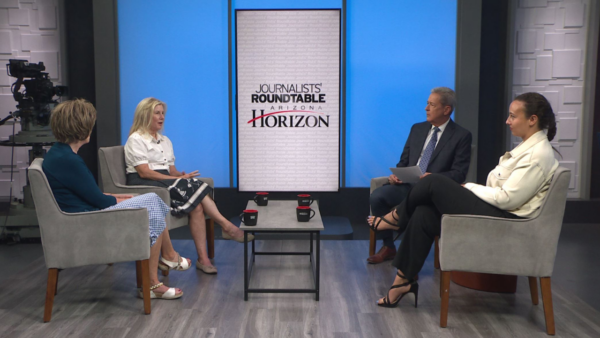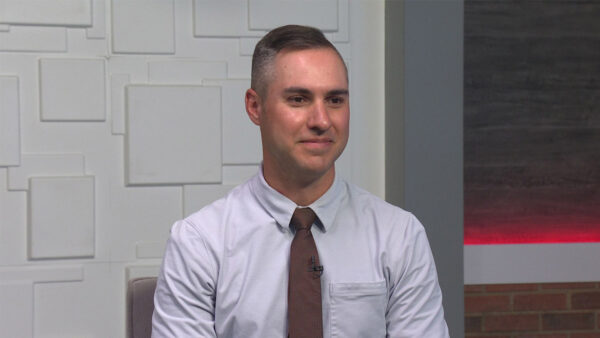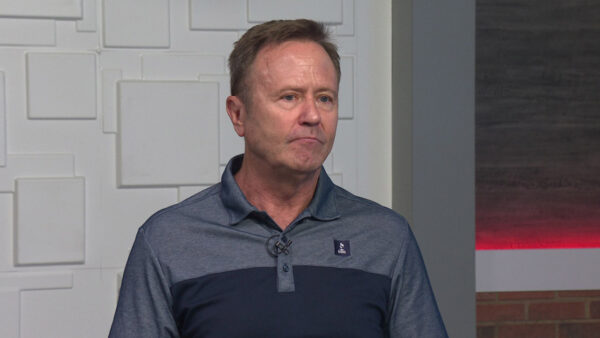Chinese solar panel manufacturer Suntech Power Holdings has announced plans to build a manufacturing plant in Arizona. Barry Broome, President and CEO of the Greater Phoenix Economic Council talks about ongoing efforts to lure renewable energy companies, like Suntech, to Arizona.
Ted Simons: Tonight on "Horizon," a major solar power company will soon base its North American headquarters here in the Valley. And a chat with Craig Barrett, the former head of Intel. That's next on "Horizon." Good evening, and welcome to "Horizon," I'm Ted Simons. Vice president Joe Biden was in Phoenix today talking about the impact of stimulus dollars in Arizona. The Vice President said only 12 states have received more than Arizona's $5 billion. He said a $250 payment to veterans alone added $264 million to Arizona's economy. He said that two million Arizona families have received a tax cut from the stimulus plan. The late Senator Carl Hayden represented Arizona on Capitol Hill for 20,773 days, a record that works out to about 56 years. The record was broken today by West Virginia Senator Robert Byrd, who now has spent 20,774 days on the hill. Carl Hayden is best remembered for helping Arizona secure Colorado River water by way of the Central Arizona Project. In other news, a Chinese solar power company announces it'll be locating its North American headquarters and manufacturing facility right here in the Valley. Sun-Tech Power Holdings Company announced the move last night. Here to talk about Sun-Tech and what this all means for the 3 state's economy is Barry Broome, president of the Greater Phoenix Economic Council. Good to see you back here, thanks for joining us.
Barry Broome: Good to see you.
Ted Simons: Sun-Tech manufacturing in the Valley. Who is Sun-Tech?
Barry Broome: Sun-Tech is China's largest photovoltaic manufacturing technology. We have been working with the company for about two and a half years. This is really a flagship company in China. It's going signal to the Chinese manufacturers that Greater Phoenix and Arizona is a place to do business. It's a big win for the Valley, and I think it's going to open doors for solar and other industries here in China.
Ted Simons: A flagship company… Compare it to something we have here in America.
Barry broome: It's on the order of a Microsoft, an IBM. If you think about enterprise excellence in China, Sun-Tech is really a pride and joy of the emergence of China's free market economy.
Ted Simons: How many jobs are we talking about?
Barry Broome: Probably in phases, it'll start with 75 and in 2010 it'll phase up to 150. It should build out to about 250 jobs. But it's possible, depending on the market, it could really go to scale. But I would say comfortably 75, another 75, and then eventually about 200 to 250 jobs.
Ted Simons: Do we know what part of the Valley, what city this thing is going to be?
Barry Broome: Well they have a site in the East Valley and one in the West Valley. They have asked us to not speak to the communities themselves. We were in competition with New Mexico, Texas and California in particular. This is the first time -- I don't know if I'm proud to say or embarrassed -- it's the first time we've beaten Texas head to head in a major project, and the first time we've beaten New Mexico in a solar project.
Ted Simons: I want to talk to about that competition in a second but back to the jobs. What kind of jobs are we talking about?
Barry Broome: Well, you know, these jobs will be production jobs. A lot of the solar capital-intensive investments are still not getting the credit in the markets. So, the markets will have to level off for us to see these really capital-intensive projects that are going to be paying really high wages. These will be jobs with health care, but they are going to be modest as far as some of the projections we had earlier. So they will qualify for the tax credit. We don't know how many will be 125% of the state wage. But these are production jobs, these are you know, 32-33 thousand a year jobs in this facility. They are going to bring their distribution center to it. We don't know how many jobs that will be yet. It's a good start on an industry that we want to be a serious player in.
Ted Simons: Back to the competition. Sounds like Austin, Texas, was the chief foe here, the chief rival in terms of getting Sun-Tech. What did we have that Austin, you think, didn't have?
Barry Broome: I think there's three things. Proximity to California is 5 really important. Sun-Tech has major objectives to service in the California market. Distribution from Greater Phoenix is much better than Austin. The second thing we had working for us was the Arizona Corporation Commission has a 30% carve-out for their distributive generation strategy. They are requiring clean technology produced in Arizona, but they promote distributive generation. That was of great interest to Sun-Tech. They have had a growing relationship with Arizona State University, as you know Dr. Crow has gone to China many times and they have established a dialogue. And then 1403 if the project grows in scale they will be able to get property reclassification and income tax credits against job performance. Right now, the first phase of the property will not be large enough to get property tax reclassification.
Ted Simons: I was gonna say, talk more about the tax incentives and that particular avenue, that it seems like was very important in getting this company here.
Barry Broome: It was very important to the company. The company's being very conservative in their commitments. So the first phase of that investment is $13 million to $15 million. I expect it'll be much bigger when it's done but that's currently what the company's pledged. Because they are not committed to $25 million, they will not get property reclassification under the solar bill. Now this is halfway there. I'm anticipating that's really a kind of a semantic, because I do think the second phase will take them over $25 million, and they will then qualify for the property reclassification. The jobs that pay 125% of the state wage, there's a formula embedded in the program so they will be eligible for a refundable tax credit based upon job performance and capital investment.
Ted Simons: The odds, people hear mostly manufacturing Chinese company, they will say, where are the six-figure jobs? Where's the glamor stuff? Where is the glamor stuff and how soon can that get here?
Barry Broome: The glamor stuff is not going to be connected to this project, quite honestly. There are two or three other projects. Right now 71 companies that are evaluating Arizona for investment, and that is based upon the condition of the market, capital investment capabilities, Wall Street, banking performance, all the things that are making things swirl in a sideways direction. Out of the 71 there are five that are evaluating it. There are about two of those companies that are going to bring engineering jobs and executive jobs. Three of them are going to be strictly production facilities. But even at $35,000 and $44,000 a year jobs with health care benefits, with unemployment reaching 10% and Arizona having 20,000 people to added AHCCCS, if they pay health care -- and unfortunately health care jobs, coverage at $35,000 a year is an important contributor to our economy right now. 7
Ted Simons: China could be an important contributor to our economy, aside and apart from Sun-Tech. Could this lead a whole horde type of business activity across the ocean?
Barry Broome: We are evaluating this right now. We are not aware of any Chinese investment that's occurred in the United States. They have invested in companies and made some acquisitions, have moved capital into the U.S. market. But an owned and operated manufacturing facility by a Chinese enterprise, we are not aware of one outside of this. I assure you all of the industrial leadership of China is closely watching this move. I do think, which has been a dream of ours, of GPEC of Dr. Crow and other people, I think China will become an aggressive inward investor in the United States. And I think Sun-Tech will signal that other Chinese companies should be in the United States, beyond solar.
Ted Simons: I know you made a trip to Germany not long ago. Are we gonna see some German companies over here?
Barry Broome: One of the things that happened, it took us two years to get our solar renewable bill passed. The Germans are investing heavily in thin-film technology, which is very capital intensive. They have made a lot of investments that they're hoping will pay off in Oregon and New Mexico. So, we were a little late, but we're in front of the curve in Spain and China. We're a little bit behind the curve on Germany. I'm still optimistic we will have a presence of German industry in Arizona. Unfortunately they've been clustered in Albuquerque and Portland. And we're hoping to de-cleat those clusters, so to speak, and got some of them in Arizona. The bills passed early enough 8 for us to get in front of Spain, Japan, China, from a foreign direct investment standpoint and I think as the market recovers, I think you'll see California companies investing in Arizona.
Ted Simons: I was going to say, last point here, somewhat ironic but Tempe-based First Solar has huge operations going on in China. And then we have a Chinese major company starting to get operations going here in Arizona. Sounds like things are happening between Arizona and China.
Barry Broome: Yeah, and you know, if you haven't had the pleasure of negotiating a transaction with Chinese business leaders we now have, it's a very different kind of transaction. And they make very long-term commitments and very serious decisions when they make an investment. I really think the move of the vice-chairman being here with Governor Brewer, and the investment of First Solar going to China, I think it's a two-way street that could be very exciting for Arizona.
Ted Simons: Alright Barry, good to see you, thank you for joining us.
Barry Broome: Thank you.
Barry Broome:President and CEO, Greater Phoenix Economic Council;























